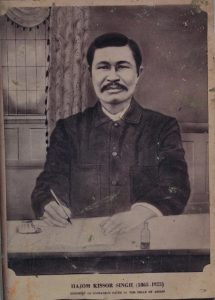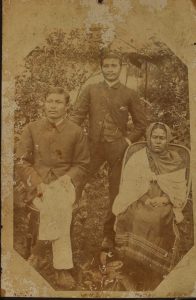Alisha Marba Rani
 The Khasi Society during the 19th Century was at a crossroad to what is termed as their Renaissance. By this time, Christianity had launched a large-scale proselytisation. The arrival of humanism and nationalistic ideas of western education turned to the favour of the liberal-minded (Marbaniang, P. G.). The expansion of Christianity led to the creation of a new society. It was felt that there was a need to maintain their own identity. The Khasi elders then launched a resistance movement.
The Khasi Society during the 19th Century was at a crossroad to what is termed as their Renaissance. By this time, Christianity had launched a large-scale proselytisation. The arrival of humanism and nationalistic ideas of western education turned to the favour of the liberal-minded (Marbaniang, P. G.). The expansion of Christianity led to the creation of a new society. It was felt that there was a need to maintain their own identity. The Khasi elders then launched a resistance movement.
The Unitarian Movement led by Hajom Kissor Singh is a socio-religious movement in the Khasi-Jaintia Hills of Meghalaya which emerged at such a time. Like most religious denominations in the world, Unitarianism is centered around an individual- Hajom Kissor Singh Nongbri who witnessed the changes happening around him. When society was undergoing rapid changes, Hajom Kissor spread his ideas. He established the Unitarian movement in Jowai, Jaintia Hills on the 18th September, 1887 which till date Khasi Unitarians celebrate as Foundation Day. The impact of the movement spread rapidly all over the region and extended to a few parts of the neighbouring state of Assam.
The advent of Unitarianism in the Khasi-Jaintia Hills was a breakaway from Welsh Calvinistic Methodist Church. The foundation therefore should be examined in the context of the religious, cultural, social and intellectual ferment that the Khasi community was experiencing in the last quarter of the 19 century and in the early years of the present millennium. (Syiemlieh D.R, Indigenous roots: Hajom Kissor Singh and the Founding of Unitarianism in the Khasi-Jaintia Hills.)
Contribution of H.K.Singh
Christianity has started taking roots in the Khasi- Jaintia Hills with the arrival of Thomas Jones. He started opening schools. Henceforth, changes started happening in the cultural life of the people. Unitarianism as a movement also started laying roots during this time. The founder of this movement had brought a lot of contributions to the Society. H.K.Singh’s contribution which the Khasi literary world failed to notice is that, apart from composing the 63 hymns, translating several English hymns and responsive readings in the Khasi hymn book of the Unitarian Church, H.K. Singh has also served as a member of the committee along with his brother Nissor Singh to co-produce the first English Khasi dictionary. Later, along with Babu Jeebon Roy, he helped R.S. Berry in bringing out the famous book on Khasi Etiquette (Ka Jingsneng Tymmen). The most important contribution of Hajom Kissor can be seen in his efforts to make the medium of examination relaxable in order to allow lower classes to give their examination in Vernacular. Hajom Kissor along with Samuel Shallam wrote to Dr. Booth in this regard. The letter got a positive response and children in Elementary schools were able to write their examinations in Vernacular.
Unitarian Faith
The liberal faith is non-sectarian and non-idolatrous. The main doctrines of beliefs are: the oneness of God, the brotherhood of mankind, the leadership of all saints and sages of all times and salvation by character. A book of Brief questions written by the founder and his colleague, Robin Roy, hundred years ago strongly shows that Khasi Unitarianism draws its theology from traditional khasi religion. As with traditional khasi religion, the emphasis of Khasi Unitarianism is duty. Unitarianism is a dutiful religion so of course is traditional khasi religion whose second command is to do one’s duty towards God and fellow humans. However, this book supports the institution of the Church and not a traditional concept.
times and salvation by character. A book of Brief questions written by the founder and his colleague, Robin Roy, hundred years ago strongly shows that Khasi Unitarianism draws its theology from traditional khasi religion. As with traditional khasi religion, the emphasis of Khasi Unitarianism is duty. Unitarianism is a dutiful religion so of course is traditional khasi religion whose second command is to do one’s duty towards God and fellow humans. However, this book supports the institution of the Church and not a traditional concept.
There was a prediction that Unitarianism would die with the death of the founder but there were leaders who worked hard and persisted. A major feat, however, came later when there was the recognition given by the British government through the granting of a restricted holiday on their Founding Day which is observed as their Anniversary in the year 1908. After India’s Independence, restricted Holiday was still granted by the Assam Government till 1975 on every 18 September. From 1976 onwards, Local Holiday is granted every year on 18 September. Though slow in growth, today Unitarians stand at having members in the East Khasi Hills, Jaintia Hills and Ri-Bhoi districts of Meghalaya and in Karbi Anglong district of Assam. (Pyrbot, D).
Unitarianism has institutionalised into a Religious Organisation with a formal hierarchical structure known as the ‘Unitarian Union North East India’. They have a symbol of a Chalice with a burning flame. The Unitarian movement has been working for the last 136 years since its inception and contributed in education, literature. It has also worked for empowerment of women and helped spread the idea that every living being is equal. The movement is now considered to bring about significant changes in the society with its liberal ideas on the issues of religious tolerance bringing about social solidarity.



